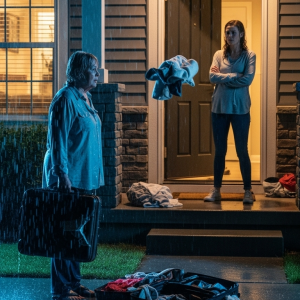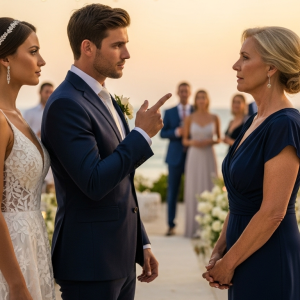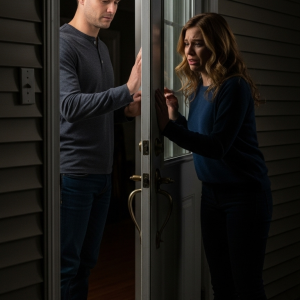My name is Elaine Murphy, and the first sign that my role in my son’s life had quietly expired came wrapped in cream-colored card stock with gold-embossed lettering. It arrived on a Tuesday, slipped between a water bill and a grocery store circular. The envelope felt expensive—thick, textured, deliberate.
Mr. and Mrs. Jason Murphy request the honor of your presence…
I had to read it twice. My son was getting married, and this was how I found out. No phone call, no heartfelt announcement. Just a formal, printed card, as if I were a distant relative they couldn’t quite leave off the list.
I stood in my kitchen, the invitation resting beside a stack of overdue bills. Jason was twenty-eight now, a success story in a downtown high-rise with valet parking. His fiancée, Barbara, was polished and poised; I’d met her twice, and both times she looked around my small apartment like she was afraid poverty might rub off. The wedding was scheduled for June 15th at the Magnolia Hill Country Club. Black Tie Optional, it said in small print. I didn’t own anything that qualified.
That evening, I called Jason. He answered on the third ring, his voice distant. “Hey, Mom.”
“I got the invitation,” I said, trying to sound cheerful. “Congratulations, honey. Barbara seems lovely.”
A beat of silence. “Yeah, she is. Listen, about the wedding—”
“I’d love to help,” I interrupted, my pen already in hand. “Maybe I can help with the flowers or tasting the cake—”
“Mom, stop,” his tone was sharp. “It’s all taken care of. Barbara’s parents are handling everything.”
“I wasn’t talking about money, Jason. I meant being involved. A mother-son dance…”
He sighed, a sound heavy with impatience. “We’ve already picked all of that. Look, just show up, okay? Wear something nice, but not, you know, too… loud. Barbara’s family is traditional.”
Something nice, but not too me. The familiar ache was rising in my chest. “I understand. I wouldn’t want to embarrass anyone.”
The call ended, leaving only the hum of my refrigerator and the silent weight of disappointment. The words Black Tie Optional gleamed under the kitchen light. Optional, perhaps. But so was I.
After that call, I made a decision. If I was going to be an outsider at my own son’s wedding, I would at least show up with my head held high. For the next three months, I saved every dollar. I skipped meals, walked to work, and clipped coupons with a miser’s precision.
By May, I had scraped together enough for a new dress. Not just any dress, but one that might make me feel like I belonged. From a department store I’d never dared enter before, I chose a deep emerald green gown, simple but elegant. It cost more than I’d spent on myself in years. I bought matching shoes and, for the first time in over a decade, had my hair professionally styled.
When the stylist turned me toward the mirror, I hardly recognized myself. The woman staring back wasn’t just someone’s mother. She was dignified. Present. Whole. For a moment, I let myself imagine Jason’s reaction—a flicker of surprise, a hint of pride.
No matter what happened that day, I was going to walk into that wedding knowing I had done everything I could—not for Jason, but for me. Sometimes, dignity is the only gift you can still give yourself.
The country club was a world away from my own. Pristine grounds, manicured lawns, and a circular drive lined with luxury cars. Inside, marble floors and crystal chandeliers glowed. I spotted Jason near a grand staircase, resplendent in a black tuxedo, laughing with Barbara’s father.
I approached, my heart a tight fist. Jason’s eyes found mine, and his smile faltered, replaced with something that looked unsettlingly like dread.
“Mom,” he said, his voice carefully neutral. “You made it.”
“You look so handsome,” I said, reaching to straighten his bow tie, a familiar gesture from his youth. He stepped back slightly, breaking the contact.
“Thanks,” he said. “You look… nice.” There was a pause before nice—just long enough to sting. Barbara’s father extended a hand, and after a moment of polite, empty chatter, I quietly stepped away. Just like that, I faded into the background.
The reception hall was a masterpiece of luxury. My name card was at Table 8, tucked in the farthest corner, right beside the swinging doors to the kitchen. My tablemates were strangers—the afterthoughts. I sat down and tried not to feel the sting of humiliation. A woman in her sixties approached with a gentle smile. “Are you Jason’s mother? I’m Margaret, Barbara’s great-aunt. Mind if I join you? I don’t know anyone else here.” I was relieved to see a friendly face.
As the evening began, I watched Jason work the room, making time for everyone except me. Dinner was served with practiced elegance—to the head table first, then tables one through seven. At our table, we waited. Eventually, a flustered server approached me. “I’m so sorry, ma’am, there was a mix-up. Your meal will be out in a few minutes.”
Thirty minutes passed. The other guests were finishing their meals. Finally, my plate arrived. The salmon was cold, the asparagus limp. Margaret glanced at it and whispered, “That’s inexcusable.” But I just smiled and said, “It’s fine.”
I was halfway through the cold salmon when I heard Jason’s voice. He was preparing for his thank you speech but leaned toward Barbara first, just loud enough for nearby tables to hear.
“Did you see they finally brought my mom her food?” he said with a smirk. “She’s used to eating what life leaves behind. She won’t mind.”
Barbara and a few others laughed. I set down my fork, my hands steady, though something inside me cracked wide open. Margaret looked horrified. “Did he just…?”
“I’m fine,” I said again, the words like ashes in my mouth. That joke was the truth of how he saw me.
Later came the parent dances. Barbara danced with her father, then her mother danced with Jason. I waited. Surely, my son would come find me. Surely, he hadn’t forgotten the mother-son dance. But he never looked my way. He was too busy, too celebrated, too wrapped up in a life where I existed only on the margins. I was invited not to participate, but to witness.
Margaret leaned over. “Are you all right, dear?”
I looked at the swirling gowns, at the man who used to be my little boy. For the first time all evening, my mind was entirely clear. “I’m perfect,” I said. And for once, I meant it.
I stood, smoothed my emerald dress, and walked toward the exit. No one noticed me leave.
Back home, the silence felt different, like something had finally settled. I changed into jeans and a t-shirt, sat at my kitchen table with my laptop, and began to write.
Jason,
I’m writing this while your wedding is still fresh in my mind. Your comment last night about me being used to eating what life leaves behind wasn’t just cruel; it was honest. And that honesty gave me perspective.
You’re right. I have spent years accepting leftovers—leftover time, attention, and respect. I taught you, without meaning to, that it was acceptable to treat me this way. I accepted scraps and called it love. But not anymore.
Effective immediately, I am ending all financial support. That includes the $500 monthly deposits you thought came from a trust fund. There is no trust fund. That was me, working overtime so you could build your life.
I am also canceling the credit card I opened in your name, which you’ve used for car repairs and vacations. And I am selling the house—the one you assumed would someday be yours. I will be using the proceeds to travel, to rest, to live.
This isn’t revenge. This is me, finally choosing to matter to myself. You’ll always be my son, but I will no longer be your safety net.
Mom
I read the email three times before hitting send at 3:47 a.m
By noon, Jason replied. His email was a torrent of disbelief and accusations.
Mom, what the hell is this? Are you having some kind of breakdown? It was just a joke. Selling the house is insane, that’s my inheritance! Barbara thinks you’re having a crisis. She knows a therapist…
I didn’t reply. By Friday, I had changed my phone number. Saturday brought another email, sharper this time.
Mom, I’ve been calling for two days. I talked to a lawyer. You can’t just cut me out of my inheritance. Call me back.
I forwarded that one to my realtor with a short note: Please expedite the listing process. By Tuesday, the house was on the market. By Thursday, we had an offer for $15,000 over asking.
Sunday came Jason’s final message.
You win. Congratulations, you’ve ruined our relationship. I hope it was worth it. Don’t contact me again.
I printed it and placed it in a folder. The closing was scheduled for July 20th. I put down a deposit on an apartment in Savannah. For the first time in thirty years, I was making plans that didn’t revolve around Jason. The woman who raised him was finally free to live.
Savannah was warm when I arrived, not just in temperature, but in spirit. I rented a small apartment and took a part-time job at a local bookstore. I spent my days surrounded by stories and my evenings walking along the water.
For three months, I heard nothing. Then one afternoon in October, my boss handed me a note. A man claiming to be my son had called. He sounded desperate.
Two days later, Jason showed up in person. He looked thinner, with dark circles under his eyes. His expensive shoes were scuffed.
“Please,” he whispered. “Can we talk?”
That evening, in a small café, he stumbled through a rehearsed apology. “I miss you,” he said. “I miss having a mother who believed in me.”
“I did believe in you,” I answered, my voice calm. “But belief without boundaries isn’t love. It’s enablement.”
He asked how to fix it, how to start over.
“You can’t,” I told him. Not because I hated him, but because the woman he took for granted was gone. I had already left. He just hadn’t noticed until the benefits stopped coming.
As I walked away from that café and into the soft Savannah night, I didn’t look back. I had spent thirty years accepting leftovers. Now, I was building a life where I set the table. And this time, I was choosing where I sat.
Winter came to Savannah with quiet rain and warm coffee. I had lived most of my life tied to someone else’s timeline—Jason’s milestones, his bills, his emergencies. But now, the days belonged to me.
I found comfort in the routines. Mornings at the bookstore with Miss Caroline, a former English teacher who still spoke in literary quotes. Afternoons spent reading on the park bench, watching the Spanish moss sway. Evenings cooking for one without apology or compromise. Broccoli again? Yes, and I love it.
But in the quiet, sometimes, I’d catch myself glancing at the phone. Muscle memory. Hopeful instinct. I wasn’t angry at Jason. The anger had dried up, leaving only the residue of realization: I had loved him so completely, I’d forgotten to save any love for myself.
Then one Thursday morning, a letter arrived.
Not a bill, not an advertisement. Real paper. Real ink. Handwritten.
Mom,
I walked into the apartment yesterday and the silence hit me so hard I couldn’t move. For a moment, I imagined you were still there, waiting with soup on the stove and some silly story about a bookstore customer.
But it’s just me now. I don’t know how to live in a world where you’re not cushioning my falls.
It went on for two pages. There were no grand apologies, no promises. Just honesty.
You were my safety net. And I treated you like floorboards—always underfoot, expected, invisible.
I’m not asking to go back. I’m asking how to move forward.
I read it twice. And then I placed it under my pillow.
Jason visited again in January. He didn’t call first. I was pruning the small rosemary bush on my balcony when I heard a hesitant knock. I opened the door and there he was, standing with a bouquet of tulips and a tin of shortbread cookies—both things I had loved twenty years ago.
“Hi,” he said. “You look… peaceful.”
I smiled. “I am.”
He stood awkwardly in the hallway. I let him in, but I didn’t move to hug him. It wasn’t punishment. It was honesty. We sat at the table. He looked at the bookshelves, the herb jars, the hand-stitched curtains.
“This place feels like you,” he said.
“Yes,” I answered. “It does.”
Jason fiddled with the rim of his coffee mug. “I’ve been seeing a therapist. Not because Barbara said to. Because I needed to.”
I raised an eyebrow. “And?”
“And I realized I never grieved Dad properly. I was ten when he left. I blamed you. I told myself it was your fault he vanished. That you were weak.”
I held his gaze. “I know.”
Tears welled in his eyes. “You weren’t. You held everything together.”
I nodded slowly. “Yes, I did.”
Two months passed. Then, in March, Barbara called.
I almost didn’t pick up the unknown number. But some foolish, motherly instinct said, What if it’s Jason in trouble?
“Elaine,” she said sharply, skipping pleasantries. “I need to ask a favor.”
Not hi, not how are you. Just favor.
“Jason isn’t doing well,” she continued. “He’s lost his job. He’s drinking. He barely leaves the apartment.”
“I’m sorry to hear that,” I replied calmly.
“I thought maybe… if you spoke to him. Reminded him who he is.”
I exhaled slowly. “Barbara, I think you already know the answer.”
She hesitated. “So you’re not going to help your own son?”
“I am helping him. I finally gave him the chance to fall. And maybe, eventually, he’ll choose to rise.”
Click.
I didn’t expect to hear from her again. And I didn’t.
In late April, Jason’s father passed away. I hadn’t spoken to Robert in twenty-three years—not since the divorce court gave me full custody and a modest child support settlement that never arrived.
Jason called from the funeral home. “He left me nothing,” he said bitterly. “Not even a photo.”
“I’m sorry,” I said. “That’s the kind of man he always was.”
There was a pause. “He never even asked about me.”
“He was too selfish,” I said.
Jason’s voice cracked. “I’m afraid I’m turning into him.”
I closed my eyes. “Then don’t. Every day you wake up is a chance to rewrite your story.”
That night, I wrote another letter. But this one wasn’t to Jason. It was to me.
Dear Elaine,
You did your best. You gave everything, often too much.
But your value was never in what you gave. It was in who you are.
You are not just a mother. You are a woman who survived.
Who thrived.
Who matters.
I folded it and taped it to the bathroom mirror. Every morning after, I read it aloud.
In June, a young woman entered the bookstore. She was browsing titles on single parenthood and resilience.
“Need help finding something?” I asked.
She looked up with tired eyes. “I’m just… trying to figure out how to do this alone.”
I smiled gently. “You’re not alone. You have yourself. And that’s not nothing.”
She nodded slowly. “That’s… comforting.”
I handed her a worn copy of The Glass Castle. “Start here. It’s brutal and beautiful.”
As she walked away, I felt it—the quiet glow of legacy. Not money. Not inheritance. But impact. Kindness. Presence.
On my sixty-first birthday, I sat on the same bench where I had first arrived in Savannah. This time, I brought a picnic basket, a glass of wine, and a single candle stuck in a lemon cupcake.
I whispered, “Happy birthday, Elaine.”
Jason didn’t call. I didn’t expect him to. I didn’t need him to.
But the next morning, a package arrived. Inside was a book.
Title: “Letters to My Mother: The Things I Should Have Said Sooner”
The author: Jason Murphy.
Inside, a note:I finally figured out how to talk to you. Thank you for never giving up on me. Even when you left.
I smiled. And I cried. And then I placed the book beside the register, in full view of every customer.
Years ago, I thought love meant sacrifice. That motherhood required erasure. That silence was strength.
Now, I know: Love includes boundaries. Motherhood is a chapter, not the whole book. Silence can be survival, but voice is freedom.
My name is Elaine Murphy.
Once, I was someone’s shadow.
Now, I walk in the light.
Not for anyone else.
For me.




